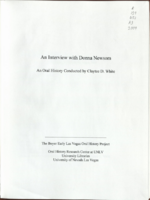Search the Special Collections and Archives Portal
Search Results

Transcript of interview with Ruth Annette Mills by Lisa Gioia-Acres, November 20, 2008
Date
Archival Collection
Description
Ruth Annette Mills was born and raised in Washington, D.C. She recalls the early years during WWII, her father's cancer and radium treatment under Blue Cross Blue Shield, his passing when she was nineteen, and her marriage that same year. Ruth and her husband and family lived in Georgia, Texas, and Maryland before coming to Las Vegas in 1968. She worked as a typist for the Office of Education at one point and did volunteer work for her church, the Cub Scouts, and the League of Women Voters. She also worked as a clerk-typist for the Clark County School District, and eventually became a teacher through the Teacher Corps program. She graduated in 1975 and was hired to teach 6th grade at CVT Gilbert. The school integration program was just beginning when Ruth was first hired as a teacher. She held the position of facilitator and recalls how angry parents were when they learned their children had to be bussed to sixth grade centers. Having been involved through her church with the Civil Rights Movement in other states, she was disappointed with the racist attitudes she encountered in Las Vegas. Ruth's involvement with health care began when her daughter-in-law developed kidney stones and was denied treatment. In 1993 she started the Nevada Health Care Reform Project through the League of Women Voters in order to support Bill Clinton's health plan. Fifteen years later, over 100 organizations had come on board to support the League's coalition in favor of Clinton's plan, and her fondest wish is that one day Universal Health Care will be available to all Americans.
Text

Transcript of interview with Donna Newsom by Claytee White, June 11, 2009
Date
Archival Collection
Description
Donna Newsom shares the history of her life in great detail, beginning with her childhood in Georgia and Florida. The family moved many times, following her father's work opportunities. Donna had a close relationship with her father and recalls the many daring adventures on which he took her. After graduating from high school, Donna earned a nursing degree at the Macon Hospital School of Nursing. She remembers dorm life, long hours, and the specific training nurses received in the late forties. Her career began at age 19 with a year of working at Macon Hospital as a graduate nurse, and then she made plans to leave the South. Donna's memories include moving to Houston, living in a boarding house, her first date, and working at Hermann Hospital and then Methodist Hospital. She then answered an ad to work at a Girl Scout camp in Colorado, and her roommate there became a mentor and one of her staunchest supporters. With help from her mentor, Donna went on to earn a teaching degree in Austin, Texas, met and married her husband Sam Newsom, and got involved in real estate. She relates the many experiences they had during Sam's Navy career, her teaching experience in New Orleans, and their eventual move to Las Vegas. Sam and Donna loved Las Vegas from the moment they moved here. She recalls many details of her employment at UMC, the differences in health care compared to down south, and the feeling of being safe no matter the time of day or night. Donna stays active in tutoring, the OLLI program at UNLV, and working for the Salvation Army women's auxiliary. She and Sam also get together with his golfing buddies and their wives for dinners in their various homes.
Text

Transcript of interview with Amber Allan by David Schwartz, December 21, 2016
Date
Archival Collection
Description
Amber Allan grew up in West Virginia and moved to Las Vegas at the age of 16. She entered the gaming industry in 2000 as a change person at Arizona Charlie’s Boulder where she later held the positions of floorperson and assistant shift manager. Allan would eventually move to Santa Fe Station in 2005 as relief shift manager, later to the Texas Station as a shift manager, and then to Palace Station in 2008 into the slot operations and technical manager role. She then returned to Texas Station at the end of 2008 as director of slot operations and then moved to Aliante Station into the same role in 2009. Allan started at Konami Gaming, Inc. in 2012 where she has worked as an analyst, product specialist, and, currently, as technical sales executive. The interview with Allan begins with her discussion of moving to Las Vegas and the experiences and roles she held as she started in the gaming industry. She discusses the various responsibilities she had in those roles, the types of skills required for them, and the kinds of disputes that are handled in certain supervisory positions. Allan also mentions and discusses the topic of hold percentage as it relates to slot and video poker players. She later describes her philosophy on what makes a good slot floor and also what customers are looking for in slots. Allan then provides the details of her move to the manufacturing side of the slot industry, and she gives her thoughts on what makes both a good and bad slot manager. The interview then shifts to the discussion of free slot play; ticket-in, ticket-out; changes in slot management; and the future of slot machines. The interview concludes with Allan’s discussion of her personal gambling as well as her advice for young people who want to go into the slot industry.
Text

Transcript of interview with Frank Paul Silver by Barbara Tabach, August 29, 2017
Date
Archival Collection
Description
In 1973, Dr. Frank P. Silver ( 1934 - ) escaped the bitter weather of Philadelphia with his choice to relocate his OB/GYN medical practice to the small community of Boulder City. In his reflections of the move, Dr. Silver recalls his wife Elaine had little input in the initial move. However, with four children to manage, she soon made a home for the Silvers. Before the move, Dr. Silver was a lifelong resident of the Philadelphia area. He graduated from La Salle University, Jefferson University Medical School and did his residency at Nazareth Hospital – all in Philadelphia. In Southern Nevada he enjoyed the weather and the excitement of building his medical practice. He mentions occasional challenges of being Jewish in the 1970s in the area. He also talks about being a shareholder in the Crystal Palace, a Laughlin casino.
Text

Transcript of interview with Millicent Rosen by Barbara Tabach, June 23, 2015
Date
Archival Collection
Description
Until her passing in 2017, Millicent (Siegel) Rosen was the living link to Benjamin “Bugsy” Siegel, one of Las Vegas’ most notorious links to the Jewish mob. A steadfastly independent woman herself, Millicent recalls Benjamin as a loving father to her and her younger sister. She is proud of his status as a Las Vegas visionary, though she affixes a footnote that the city of today might not be to his liking. She includes a few anecdotes about common names of the early days, including Meyer Lansky who walked her down the aisle when she married Jack Rosen. They had three children: Benjamin, Cindy, and Wendy. Millicent moved to Las Vegas to be with her daughter and her family in about 2000 and cherished her role as a grandmother. Always an artist at heart, Millicent once painted canvases for needlepoint and in 2015 promoted her clothing line.
Text

Transcript of interview with Yvonne and Joni Fried by Barbara Tabach, February 17, 2016
Date
Archival Collection
Description
Yvonne Fried, M.D., and Joan “Joni” Fried are the daughters of Milton and Esther Fried, the founders of Freed’s Bakery—the standard to which all other Las Vegas bakeries are held. When the Fried family moved to Las Vegas in 1955, Joni was born here, the fifth child, of the entrepreneurial Milton, a musician by night, and his industrious wife Esther, who guided the family business. As Esther’s 2006 obituary reads: in 1959 the couple opened “a snack bar, selling donuts and Danish, at the Panorama Market on West Charleston, while Milt played in the show band at the Sahara Hotel in the evenings.” For Yvonne and Joni, this made for a rather busy and interesting household to grow up in. Their Jewish upbringing was at Temple Beth Sholom. Photo above honors the multi-generations of the Freed’s Bakery tradition: (L-R) Joni Fried, Anthony & Sarah Fusco (Joni’s daughter) Max Jacobson Fried (Yvonne’s son) holding his son Lucas, and (far right) is his wife Emilia.
Text

Transcript of interview with Harriet Trudell by Caryll Batt Dziedziak, May 3, 2006
Date
Archival Collection
Description
Born on August 22, 1935, Harriet spent her childhood years in the segregated southern cities of St. Petersburg, Florida and Mobile, Alabama. Daughter to a blue collar plumber, who was also a union organizer and ‘rabid Democrat,’ Harriet recalls her father saying, “Remember children, you know what meat tastes like because there’s a man named Franklin Roosevelt.” Unsurprisingly, she grew up thinking Roosevelt was God. With her mother’s sudden death at age thirty-one from a cerebral hemorrhage, ten year old Harriet spent two years at a boarding school before rejoining her younger brother at her maternal grandparents in St. Petersburg. Florida. During this time, her father also based out of the grandparents’ home while following big construction work opportunities at various cities. In 1948, sixteen-year-old Harriet accompanied her father, an Alabama Delegate, to the Democratic National Convention. Hearing Hubert Humphrey’s Civil Rights speech change her life. “I came home from that conve
Text

Transcript of interview with Valerie Wiener by Barbara Tabach, January 20, 2015
Date
Archival Collection
Description
Valerie Wiener is an accomplished state senator, business owner, president and founding member of the Public Service Institute of Nevada and the Valerie Wiener Foundation. She was born October 30, 1948 in Las Vegas, Nevada. Her service as senator for 16 years and her role as a public servant led her to become the first woman assistant majority leader of the state senate in Nevada. She graduated with a bachelor degree of Journalism at the University of Missouri/Columbia within the School of Journalism earning a Masters of Arts in Broadcast Journalism and a Master of Arts in Literature at the University of Illinois in Springfield while attending law school at McGeorge School of Law in Sacramento in the 1970s. Her generosity is also seen through scholarships and activities at the Louis Wiener Jr. Elementary School. In addition, Valerie is a professional speaker, consultant, and internationally published author. She is the recipients of many awards, such as: ?Women of Achievement Award? in Media; ?Healthy Schools Heroes?; ?Public Affairs Champion Award?; ?Legislator of the Year?, and the Nevada Secretary of State?s recipient of the ?Jean Ford Participatory Democracy Award.? She stays active through her commitment to the Nevada Senior Olympics for both Fitness and Weightlifting earning 17 gold medals from 1998 to 2007. In this interview, Wiener discusses her childhood and being raised in Las Vegas in the 1950s as well as the academic path that led her career into politics. She shares memorable insight into the life of her father, Louis Isaac Wiener, Jr., an accomplished attorney and business man who represented the infamous Benjamin ?Bugsy? Siegel during the construction and opening of the Flamingo Hotel and Casino in 1946. Throughout Wiener?s interview, she highlights the traditions of the small, but growing Las Vegas Jewish population in the 1960s. Among the people she recalls most vividly is her grandmother Kitty Wiener. Wiener also discusses her community service work and her life mantra of giving.
Text

Transcript of interview with Raymonde Fiol by Barbara Tabach, August 12, 2015
Date
Archival Collection
Description
In this interview, Fiol discusses her experience as a a hidden child in the Holocaust and her family's history. She also talks about her involvement with the Las Vegas Holocaust survivors group.
Raymonde "Ray" Fiol is president of the Holocaust Survivors Group of Southern Nevada. A Jewish Holocaust survivor whose parents were killed in Auschwitz, Fiol was hidden by a Christian family of Resistance fighters during her childhood in Nazi-occupied Paris, France. She married American serviceman Phil Fiol and left Paris in 1957. The couple lived in New York City where she worked in inventory control. She retired to Las Vegas, Nevada around 2003 and became active in the local Holocaust Survivors Group. In 2007, she became president of the organization, which provides essential services to Holocaust survivors and helps them share their stories. Fiol is also a member of the Nevada Governor?s Advisory Council on Education Relating to the Holocaust and the coordinating council of Shoah International. Her dedication to preserving the memory of the Holocaust and caring for survivors earned her the Nevada Senior Citizen of the Year award from the Nevada Delegation of the National Silver Haired Congress and the Aging Services Directors Organization in 2014, and in 2013 she was named Mensch Volunteer of the Year by the Jewish Federation of Las Vegas. In this interview, Ray reflects upon her traumatic childhood experiences, and shares how she learned details of her family?s history from a woman in France who had researched the destiny of the local Jewish community. She also discusses her involvement with the survivors group, and the positive impacts of its outreach activities, as well as goals to ensure future generations learn about, and from, the Holocaust.
Text

Transcript of an interview with Gertrude Rudiak, Richard Rudiak, and Dani Ramage by Barbara Tabach, December 30, 2015
Date
Archival Collection
Description
On December 30, 2015, a few months after her 100th birthday celebration, Gertrude Rudiak, with the help of her son Richard Rudiak and granddaughter Dani Ramage, reminisced about living in Las Vegas since 1946, nearly eighty years. They explore the ancestral roots of Gertrude (n?e Rightman) and of her deceased husband George Rudiak. Their courtship and marriage at the brink of World War II and George?s enlistment in the US Army Corps is what brought the couple to Las Vegas and the gunnery school which is now Nellis Air Force Base. After his tour of duty, George settled into a law practice where he specialized in quickie-divorces, but also carved out a reputation supporting civil rights and working for legislation to eliminate working and living discrimination of blacks in Nevada. Gertrude was an active member of Las Vegas. She played the pipe organ, hosted large Seders at Passover and managed the Rudiak household that grew to include five children. Over her long life, Gertrude embraced many positions on community boards, including being Temple Beth Sholom?s first female board member. She was also a teacher in both secular and Jewish education. Her efforts have been recognized by the Jewish National Fund, the United Jewish Appeal, and the Anti-Defamation League. Additionally, Mayor Carolyn Goodman presented Gertrude with the distinguished honor of a key to the city of Las Vegas in 2014. The city declared August 2, Gertrude's birthday, Gertrude Rudiak Day in recognition of her long-standing commitment to Las Vegas.
Text
